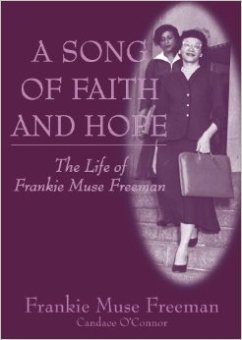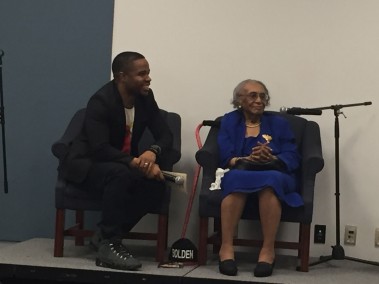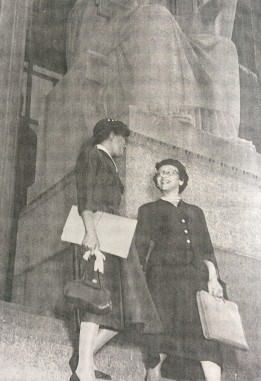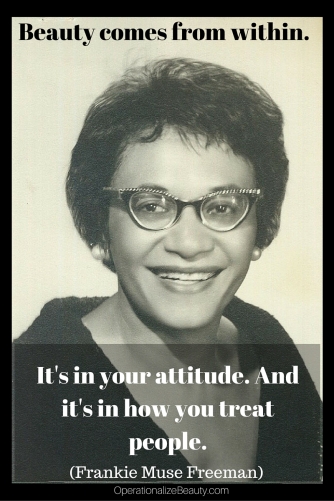Frankie Muse Freeman will be celebrating her 100th birthday this November. She could be sitting at home, resting on the laurels of her innumerable accomplishments. But that’s not how she rolls. Instead, she is speaking out about the progress we have made as a nation in the area of civil rights, and what we can continue to do moving forward.
I read her book, A Song of Faith and Hope. I saw her speak at a local library event. And I was honored to speak with her over the phone. Here are just a few lessons I have learned from Mrs. Freeman.

1. Just do it.
Growing up, Frankie always heard people say they were “fixin'” to do this or that. Her parents didn’t love that. Instead, they encouraged Frankie and her siblings to get on with it– don’t “fix” to do it, just do it! (I think Yoda would have approved)

Frankie carried this simple yet powerful message with her throughout her life. I can’t help but think that many of her accomplishments are largely due to this mantra– this drive to just keep DOing.

At the last event at which she spoke (pictured above), Mrs Freeman was introduced as being the first African American woman to serve on the U.S. Commission on Civil Rights. When it was her turn to speak, she corrected the mistress of ceremonies: “I was not the first African American woman to serve on the Commission. I was the first woman period. Black, white, yellow, blue, or otherwise,” to which she received thunderous applause.

The list of Mrs. Freeman’s accomplishments is staggering. Not only was she a rock star of a civil rights attorney, winning a landmark victory that ended racial segregation in public housing in St Louis, she went on to serve on the very housing commission she had just defeated in court, to help them implement the changes she demanded. As mentioned above, she was the first woman to serve on the Civil Rights Commission, and went on to become Inspector General for the Community Services Administration (these are positions appointed by the President of the United frickin States, y’all). The number of hats she has worn is staggering– from being the national president of her sorority to serving on just about every board known to man, including (but nowhere limited to): the League of Women Voters, the National Council on Aging, the YWCA, the Girl Scout Council of St Louis, the St Louis Urban League, the National Council of Negro Women, the World Affairs Council of St Louis, oh, and the African American Jewish Task Force (no, she’s not Jewish, she just thinks its cool to reach out across cultural and religious boundaries). Now, with a resume like this, you might be thinking, “Oh, she’s had a great life.” You might even call it ‘charmed.’ You would be wrong.
Loss has not been a stranger to Mrs. Freeman. She has buried her mother, her father, and her husband. But she has also buried her son– a grief no human should have to endure. And she has battled cancer–twice– and won.

She has also fought one hell of a battle professionally. In her book she recalls one particular instance in Alabama, where she and the Civil Rights Commission were conducting hearings focusing on economic rights in Montgomery. In her words:
One evening, after the Montgomery hearings, I returned to my motel room after dinner. It was a pretty evening in April and I had the curtains open; I could look out– and anyone who wanted to could look in. I was sitting at a table with a member of the Alabama State Advisory Committee, reviewing the day, when boom, something struck the window and broke it. I thought it was a bullet. It apparently was intended for me, but I was not hit.
She was also fired, at least twice, for speaking up and being a “trouble maker.” But you think a little death, cancer, and possibly a bullet is going to stop Frankie?! She could have given up and not one person would have blamed her or said she hadn’t done enough. But nope. She just. Kept. Moving. As she says in her book, you have to keep your hand on the plow.
Even today, Frankie is a do-er. At the aforementioned speaking event, she was joined by youth activist and motivational speaker Koran Bolden. When asked about entities working to keep people divided, Koran spoke powerfully about how and why today’s youth needs our support. Frankie was so moved she jumped in and said, “What you just said touched everybody here, so there is no reason they can’t start tonight.” She went on to encourage everyone in the room to support Mr Bolden’s mission, saying, “Don’t wait until tomorrow for something that can start tonight. It is an individual’s responsibility to bring about change. Let’s begin it and let’s get on with it.” I have a feeling that Mrs Freeman has rarely waited for tomorrow.

Is there anything more beautiful than a woman who doesn’t say she’s “going to” do this or that, but actually goes out there and does it?
2. You are powerful.
Mrs. Freeman grew up in Danville, Virginia, the last capital of the Confederacy. She and her family lived on the 200 block of Ross Street, where all of her neighbors were black. The 100 block of Ross Street was a white neighborhood, and young Frankie and her siblings would walk through that neighborhood on their way into town. Mrs Freeman remembers that white children playing outside would often smile and say “nigger, nigger, nigger” and she and her siblings would smile back and say “cracker, cracker, cracker.” When the Freemans needed their shoes repaired, they would take them to a shop in the basement of Mr Wrigley, a white man. When the shoes were ready, Mr Wrigley’s children would return them to the Freeman family. These were normal occurrences.

Peaceful though it was, little Frankie grew up knowing that people who looked like her were treated differently, and that was not ok. She also grew up knowing that she had the power to change it. Her parents taught her that if you stand for something, there will be times when you have to say, “Enough”– but that doesn’t always mean you make a scene right then and there. She was always encouraged to do something that would be effective. Public transportation was segregated in Danville, so the Freeman family simply walked everywhere they went. If a friend of the family was mistreated in the local department store, the Freeman’s would no longer shop there. Frankie’s parents, Maude and William, were very active in Danville so Frankie grew up seeing her parents making a positive impact their community, and she knew she could too.
3. Make your own path
When the black community in Danville could not get a loan from the white owned banks, Frankie’s relatives started their own bank.
After graduating from law school, Frankie applied to law firms in St Louis. She was told they could use her in the office, perhaps to do research, but they would not hire her to try cases. Following her relatives’ lead, she started her own practice. She met with judges in St Louis and tried the cases no one wanted. The first few times she showed up to the courthouse and told the clerk which case she was there for, she was told to have a seat and her lawyer would be there shortly. But it wouldn’t be long before they learned who Frankie Freeman was. (By the way, Mrs Freeman practiced law until 2009. That’s 62 years!)

4. You do not acquiesce.
Throughout her book, this mantra “Later for you” pops up again and again. I loved seeing it every time because I knew it was a promise, and I knew whatever the situation was, Frankie was going to make it right. Like at a restaurant in Flat River, Missouri. Or a coffee shop in Louisville. Here is how she explains it:
Sometimes when you beat your head against a brick wall, you have to realize that you are damaging your head, not hurting the wall. Therefore, you do the best you can so long as you do not acquiesce and you do not give up. You say, “later for you,” and promise yourself that when you can do something about it, you will.
There were times when Mrs Freeman chose to give in to the law of the time, in lieu of being arrested. She knew she could do more in the courtroom than she could in the jailhouse, so she promised, “later for you” then got to work changing the world. (More on that below).
When I spoke to Mrs Freeman, I asked her what she sees today that makes her think, “Later for you” — what do we still need to work on? Living in St Louis, I was expecting a comment on the police violence that we have been hearing so much about. But she surprised me when she said that every state in America still has segregated schools. “Not by law, of course, but it is true.” She told me that there is still racial segregation, or isolation, in public schools today. And I don’t have to look farther than my own childrens’ school to see that she is right. We live in a suburb of St Louis, and the majority of the students are white. In fact, the few African American students we do have are those who are bussed in from the city. Frankie laments that diversity is not yet as valued as it should be. She is saddened to think that children don’t have the chance to really play and interact with kids who look different from them until they are adults. She encourages working with teachers and parents alike to figure out a solution. She told me that she called for more diversity and spoke about the value of it in 1969, and can say the exact same thing now. As she said in her book, “To move away from racism, I feel we need to get to know one another.” And getting to know each other should start happening at a young age.
5. Speak. Up.
Frankie didn’t always say “Later for you” to herself. As a matter of fact, she spoke right up when she found herself in a situation she knew was unfair, unethical, and unconstitutional. For instance, in February of 1961, Frankie was making her way via bus to Hayti, Missouri to be the keynote speaker at an event held by her sorority, Delta Sigma Theta. On the way, the bus stopped at a restaurant in Flat Creek. She got off the bus with the other passengers and made her way to the restrooms. A waitress loudly informed her that “The colored use another entrance.” When Frakie proceeded towards the ladies room anyway, a white customer blocked her path and repeated what the waitress had just said, “Colored can’t come in here. You have to go to the other side.” Frankie froze. The bus driver got involved and defended the restaurant’s policy. Frankie thought about pushing the lady out of the way– but what would that solve? Frankie would have been arrested and her sisters in Hayti would have no speaker for their event. Instead, Frankie headed back to the bus and re-wrote her speech. (This might sound like Frankie gave up, but stay with me).
At the next stop, Frankie called home and asked her husband to contact a friend of theirs, attorney Charles Oldham. She wanted to file a complaint against Greyhound and against the restaurant, and file a complaint she did. Greyhound soon issued an apology and the restaurant agreed to change its policy. Two weeks later, when some folks visited the restaurant to make sure they had carried out their promise, they found that the separate facility for “colored” had been eliminated.
She had a similar incident at a coffee shop in an airport in Louisville. She was denied service, she spoke up, and changes were made. Mrs Freeman was confident enough to stand up because she knew she had the Constitution on her side.
6. Stay humble.
In her book, Frankie tells the story of when she was nominated as president of her Sorority. Now, let me point out that Frankie did not join while she was in college. She had known about Delta Sigma Theta when she was an undergrad at Hampton Institute, but they did not have sororities on campus then. And while studying law at Howard, she had no time to join. So it wasn’t until after she had received her law degree and was living in St Louis that Frankie became involved in the nationally known public service sorority. She worked hard for the sorority, and in 1967 she was on the ballot for national president. Now, the results of the election were to be announced at a banquet on the third day of a national convention. But word got out that Frankie had won, and she was receiving congratulatory phone calls while she was trying to get ready for the banquet. Consequently, she was late. In her own words:
I was late, honestly late; I am never late, but I truly was that time. However, some people thought I was coming in late on purpose–that I knew I was elected and was trying to make an appearance. Jeanne Nobel teased me later that I had “flaunted in,” but I replied that “I don’t flaunt.”
When you have lived the life Frankie Freeman has lived, you don’t have to flaunt.
While I was talking to Mrs Freeman on the phone I confessed that I had been holding onto her phone number for a couple of weeks, but I hadn’t had the courage to call her. I told her I was a bit intimidated because she is such a big deal. She just laughed and said, “Oh, I am not a big deal. I am a 99 year old woman!”
Well, that didn’t convince me. Frankie is most certainly a big deal, and she has every reason to flaunt. But she stays humble, and that is beautiful.
(See, I told you she was a big deal)
7. Do your homework.

Frankie’s mother was a public school teacher, and though she gave up her career to stay home with her children, she never stopped teaching. The Muses were strong believers in the power of education, and told her children that once they got an education, no one could take it away from them. Maude knew her children would go to college, the only question was where. She and William paid for their own children’s education, but Maude went even further and raised scholarship funds so other children could pursue their education as well.
Frankie remembers that her parents– her mother especially–filled their home with books. When I spoke with her, Frankie recalled: “There were books all over the place– and we had to read them all!” But she didn’t mind. She loved reading anything she could get her hands on.
When I asked her what the best piece of advice she had received was, she paused for a long moment and really thought about it. She finally answered, “My teacher told me to do my homework. That was the best advice.” And I can see that throughout her life, Frankie did just that. She worked hard, both in school and in the courtroom, and brought about real change in her community and her nation. That’s pretty damn beautiful if you ask me.
8. Take care of yourself.
Looking at Frankie’s life, it is easy to get the impression that she was all-business. How else could she have accomplished everything that she did? That is why I love this story of her just throwing caution to the wind and doing something unexpected: After being fired (the first time), Frankie went out and treated herself to something she had always wanted– a full length mink coat (don’t tell PETA). She put it on her husband’s credit card, but told him not to worry, she would pay it off as soon as she got back to work. Which, was like, the next day.
When I talked to her on the phone, I brought up some things she had mentioned in her book that had brought her joy. One of these things was cooking. I could hear her smile through the phone when she explained that, especially in the beginning, she was working so hard to get her career going, that she had to take time to relax, and cooking helped her do that. She told me her favorite thing to cook is her famous corn pudding, or her veggie salad with marinated green peppers, celery, tomatoes, and whatever other vegetables she can find. (My mouth is watering).
There is no arguing that Mrs Freeman worked hard throughout her life, but she knew how to treat herself as well. And that is beautiful.
At the end of my conversation with Mrs Freeman, I asked her what her definition of beauty is:

I was honored and inspired to have to opportunity to not only see this beautiful woman in person, but speak with her personally. She is truly an inspiration, and an example of what one individual can accomplish if they would just get to it.
Unless otherwise noted, all information and images were taken from Mrs Freeman’s book, her speaking engagement at the St Louis County Library Headquarters, or from my personal interview with her.







What an amazing woman! Thank you for sharing this post!
LikeLike
She really is! In Mrs Freeman’s book she mentions learning and singing the Black National Anthem. I was curious, but didn’t have time to look it up. I was happy to see it is the subject of your most recent post! Scrolling through your site, we seem to be pretty like-minded bloggers! I love finding and sharing little-known and inspiring stories! Thanks for stopping by!
LikeLike
Me too! Love black history! I’m going to follow your blog. Thanks for commenting!
LikeLiked by 1 person